Stay in the know on all smart updates of your favorite topics.
Amsterdam Donut Coalitie Meetup #4
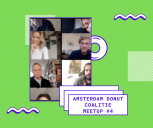
Ben je bezig met een donut-gerelateerd initiatief, wil je verbinding leggen met de donut community van Amsterdam en tot actie komen? Meld je dan aan voor de volgende Amsterdam Donut Coalitie Online Meetup #4 op 18 februari vanaf 16.00 - 17.00 uur. Reserveer je digitale plek via deze link https://bit.ly/35PnSzb
Knowledge Quest: Submit Your Example of a Great High Density Environment

Do you know a great example of high density living environments built within the last 30 years? Share your knowledge and contribute to the creation of an open repository via Crowd Creation. To be truly exemplary, the area should include a mixture of functions (at least some of them high-rise) where the physical fabric retains a human scale at street level despite the high density.
You may wonder who's asking for and compiling this information: the Chair of Spatial Urban Transformation at the Amsterdam University of Applied Sciences is committed to building an open-access repository. Sharing best practices across the globe is becoming increasingly vital, especially as many of our western cities are on the eve of unprecedented densification. As a humble thank you for helping to guide this societal challenge, they've allotted 12 rewards for contributors. Click here to submit a project.
Societal Context
Like many of our Western cities, Amsterdam is on the brink of intensive urban densification. The metropolitan area of Amsterdam plans to add 100,000 new dwellings, mostly within the existing urban fabric. Compact studio apartments and new situational typologies of high-rises are part of the program, which will increase the densification even further. How are we to retain a human scale in these new high-density environments, especially at the street level where our social fabric is shaped? This calls for a new array of examples and precedent studies of successful existing "Great High Density Environments." What are their design properties and how are they programmed? How do they succeed in retaining a human scale?
 Amsterdam - Image Courtesy of Amsterdam University of Applied Sciences
Amsterdam - Image Courtesy of Amsterdam University of Applied Sciences
Sensing Streetscapes Project
These questions are central to the Sensing Streetscapes Project initiated by the Chair of Spatial Urban Transformation at the Amsterdam University of Applied Sciences (AUAS). In a consortium of spatial design offices and clients of large scale projects, action research is explored along three lines. First, building on the classic works of Allan Jacobs, Jan Gehl and the like, six of the most-used reference locations for these new environments are deconstructed by research through design. Second, neuro-architectural technologies (eye-trackers) are deployed to uncover the visual impact of the applied design principles: What are the patterns? Do these design solutions indeed mitigate the high density and intensity to a human scale on the level of the streetscape? Finally, an algorithm is developed to trace the most suitable best practices via AI. That’s where you come in.
 Cassilis Road, London - Image Courtesy of Amsterdam University of Applied Sciences
Cassilis Road, London - Image Courtesy of Amsterdam University of Applied Sciences
Repository of Great Examples by Crowd Creation
Some high profile examples of great high density environments are well known, like in Vancouver, Toronto, London, Manchester, Amsterdam, Hamburg, and Manhattan. Yet what lesser-known examples of Great High Density Living Environments are out there for us to learn from? Share your knowledge and contribute to the creation of an open repository via Crowd Creation.
In order to frame the search, a list of desired characteristics:
- Residential environment in an inner city area
- Built within the last 30 years – or about to be 'opened' soon
- Built for High Density with some high-rise buildings
- Success in creating a human scale at eye-level on the street
- Some level of mixed functions, green design, etc. - anything that increases the livability of the environment
Click here to submit a project.
 Hardman Street, Manchester - Image Courtesy of Amsterdam University of Applied Sciences
Hardman Street, Manchester - Image Courtesy of Amsterdam University of Applied Sciences
You are, of course, allowed to offer one of your own projects as an example. The deadline for submissions is January 29th, 2021 and as a modest gesture of thanks for helping address this societal challenge, 12 rewards are available to contributors. Out of the projects that fit the characteristics, consortium members will select the contributors who delivered either multiple great examples, surprisingly interesting examples, or in-depth descriptions and pictures. 12 entrants will be randomly selected to be rewarded:
- 2 will receive personalized book selections on this topic (favorites of the Chair)
- 6 will receive an Amazon gift card with a value of €50
- 4 will receive a ticket to the Media Architecture Biennale 2021
- Winners will be notified personally
Visit the results at https://sensingstreetscapes.com. The website will remain open afterwards, so feel free to keep sending your examples!
Dissertation ideas to look into about sustainable festival management in cities
Hey! I am a student from Finland looking to write my dissertation about the way city based festivals can thrive sustainably in a 'post-Covid-19' world and tackle sustainability issues with the support and co-creation of initiatives of the 'smart city' as well as city council.
Essentially I am aiming to argue how 'smart city' initiatives such as seen in Amsterdam and Helsinki could help festival management engage better with tackling sustainability issues cheaply, by for example offering event spaces, expertise, waste management which can be expensive processes...
Any advice is much appreciated, thank you !!
Masterclass Impact Business Modelling - GO!-NH

Masterclass Impact Business Modelling
Op confronterende, inspirerende en energieke wijze ondervinden deelnemende bedrijven wat de uitdagingen en kansen zijn van vernieuwende businessmodellen met maatschappelijke en ecologische impact. De wereldwijde economie en maatschappij is in transitie en wij hebben hierin een rol te spelen. Maar hoe is de vraag… Met praktische cases wordt duidelijk wat er daadwerkelijk nodig is voor de duurzame groei van een bedrijf en vergroten van de impact op de wereld.
Event report: State of the Region AMA

The ambition is clear: the Amsterdam Metropolitan Area must become a high-class region. How? ‘Only together'
Placemaking Week India 2021

Calling environmental scientists, heritage conservationists, place brandologists, local administrators, urban designers, architects and citizen intermediaries to engage with Placemaking India in the run-up to its annual meeting.
We at #PlacemakingIndia are planning a moveable feast of beachfront, backwaters, riverbank and lakeside encounters in and around Mangaluru on the southwest coast of India in early December 2021.
Join us on the shores of the Arabian Sea in our India-wide mission to shake up spaces into #loveableplaces. Signal your interest to info@thesmartcitizen.org
#placemaking #communalspaces #heritagebuildings #culturaltourism #watersideplacemaking #urbanplanning
Want a printed version of my free e-book Cities of the Future?
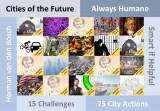
Recently, I published my new e-book: Cities of the Future. Always Humane. Smart if Helpful.
You can download this book for free here:
Dutch version
https://www.dropbox.com/s/ytdadwgdsdw6zke/Looking%20for%20the%20city%20of%20the%20future%20NL.pdf?dl=1
English version
https://www.dropbox.com/s/kfywoszhrn4xi5j/Looking%20for%20the%20city%20of%20the%20future.pdf?dl=1
In case you prefer a compact printed version in Dutch (180 pages), transfer €20,00 to IBAN NL35 INGB 000 167 55 50 on behalf of H. van den Bosch, mention your address and you will receive your copy in a few days
The Hungry City #58: Growing new flavors

Join us during this event about food cultures and growing food in a super diverse city on Dec 9 | 20:30h at Pakhuis de Zwijger.
More than 180 nationalities have settled in the super diverse city of Amsterdam. All these cultures and culinary traditions can be found in the many eateries, living rooms and markets. They are an important part of a neighborhood's urban culture. In this program we go on a tasty journey through Amsterdam Southeast. We talk about the rich variation in culinary traditions and eating habits and how these can disappear or change with the transformation of the district.
Registration
This event takes place at Pakhuis de Zwijger and is organized in collaboration with AMS Institute. Register for this event here.
This event will be in Dutch.
AMSTERDAM DONUT COALITIE COMMUNITY GET-TOGETHER
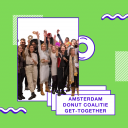
Wil je eindelijk tot actie komen, de community van de Amsterdam Donut Coalitie leren kennen, verbindingen leggen, je eigen projecten delen of bij een bestaand donut economie project aansluiten? Schrijf je dan gratis in voor ons community event: donderdag 10 december vanaf 16.00 - 17.30 uur. Meld je aan via dit formulier. Een week van tevoren ontvang je een bevestiging met de link naar het online evenement. Samen naar een regio Amsterdam die iedereen een eerlijke sociale basis biedt, binnen veilige ecologische grenzen!
Start inhaarlemmermeer.nl

Lokaal Community Platform voor bewoners, bedrijven en bezoekers van Haarlemmermeer. (Amsterdam Metropolitan Area)
Sinds 1995 zijn wij inwoners in de gemeente Haarlemmermeer. In de afgelopen 25 jaar is er veel veranderd binnen de gemeente. Soms als antwoord op, maar vaker vooruitlopend op de ontwikkelingen. De gemeente groeit. Mensen willen er wonen, werken en studeren, maar ook meer bedrijven vestigen zich hier in het hart van de economie.
Daarnaast vertegenwoordigen toeristen en evenementen in de regio elk jaar een aanzienlijk aantal bezoekers.
We denken na over het juiste evenwicht tussen leefbaarheid en welvaart.
- Over duurzaamheid en sociale verantwoordelijkheid.
- Over lusten verhogen en lasten verminderen.
- Over een integrale aanpak die zowel bewoners centraal zet, als bezoekers gastvrij ontvangt.
- Onze focus ligt op beter en niet op meer.
- Op kwaliteit en niet op kwantiteit.
We dragen actief bij aan een leefbare, aantrekkelijke en welvarende gemeente waar de economische ontwikkeling niet ten koste gaat van de leefbaarheid.
We werken intensief aan het verbeteren van de reputatie van Haarlemmermeer.
Wij willen met dit Community Platform bewoners verbinden zowel jong als oud. Ideeën transparant maken en een ieder hierbij betrekken. Elke leeftijdsgroep moet hiervoor in aanmerking kunnen komen. Door het initiëren van dit platform hopen wij bewoners een kans te geven door zijn/haar ideeën te ventileren en eventueel te implementeren, zodat wij allen als bewoners van Haarlemmermeer hiervan gebruik kunnen maken. Door het zichtbaar maken van de mogelijkheden en behoeften kunnen we de band als bewoners versterken en hierdoor een veilige, sfeervolle leefomgeving creëren.
Wij zijn dit community platform gestart vanuit onze eigen ideologie. Het geloof om een community te starten waar mensen elkaar kunnen helpen en bereiken. Waar wensen werkelijkheid kunnen worden als we gezamenlijk onze krachten bundelen. Laten we starten met de bewoner die bepaalt wat er noodzakelijk is en de gemeente kan informeren over de benodigdheden.
#Citizens&Living #DigitalCity
Wicked Problems
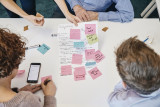
Te wicked? Niet voor ons.
Wij werken allemaal aan urgente, complexe, maatschappelijke uitdagingen. Issues die schier onoplosbaar lijken, van dilemma’s en paradoxen omgeven, nog niet duidelijk hoe het moet. Wel is duidelijk dát het moet, dat we elkaar nodig
hebben en dat we er NU aan moeten beginnen. Om met de woorden van Jan Rotmans te spreken; we leven niet in een tijdperk van verandering maar in een verandering van tijdperk. En hier hoort een nieuwe gereedschapskist bij.
En of je nou aan energietransitie werkt, andere mobiliteitssystemen, creëren van waterstofhubs, peer to peer autodeelsystemen, het maakt niet uit, we zien dat al deze opgaven op enig moment tegen gelijksoortige barrières aanlopen. Op samenwerking, financiering, privacy, onvoldoende aansluiting op de maatschappij, om maar een paar voorbeelden te noemen.
Unieke samenwerking
Als Amsterdam Smart City netwerk willen en kunnen we deze opgaven niet laten liggen. Door het bundelen van onze kennis en expertise kunnen we als netwerk iets unieks bieden en de wil en durf tonen om deze barrières te doorbreken. De betrokken partners die dit uitdenken en begeleiden zijn RHDHV, Kennisland, Drift, NEMO, Arcadis, Alliander, HvA en Metabolic. Zij bundelen hun expertise en ervaring om de echte vragen boven tafel te krijgen, tot nieuwe manieren van samenwerken te komen en barrières te doorbreken. We richten ons met name op de start van de samenwerking. Gezamenlijk ontwikkelen we een ‘wicked problem aanpak’. Op een nieuwe manier, lerend door te doen, exploratief.
Waar moet je aan denken?
Wat is eigenlijk het echte probleem? Wiens probleem is dit? Hoe kijken anderen er tegenaan? Welke andere partijen lijken nodig? Hoe vind je ze? Hoe ga je om met eigenaarschap en botsende frames? Hoe zorg je dat je al in
een vroeg stadium de maatschappij (bewoners, ondernemers, werknemers, etc) betrekt en hun ervaringen in het project trekt? Het wicked problem team zet nieuwe methoden in voor het beantwoorden van deze vragen. En het creëren van de benodigde commitment om het vraagstuk aan te pakken. Niets staat van te voren vast, want we passen ons aan aan wat we tegenkomen. Met elkaar ontwikkelen we een nieuwe aanpak om de barrières te doorbreken.
Digital Twins
Interested in implementation of data privacy in digital twins. Contact me for projects in health & citizen data.
Roundtable 'Sharing Cities: Shaping Tomorrow' (free)

We need to see opportunities (including the growing momentum for building back better and accelerating transformation processes) as much as thinking of challenges. This roundtable aims to provide a creative and refreshing opportunity to focus on chances more than only challenges. We will explore how to think of opportunities, of ways forward, of hope and ambition. We want to also investigate how sharing cities are connecting and merging with different agendas and topics in Europe and around the world.
TALENT DISCOVERY IN THE AGE OF SMART CITIES

At a time of accelerated growth and ubiquity, connectivity technologies like AI and quantum computing allow us to find ourselves anywhere quickly. The most important question to ask is therefore where exactly do we want to be.
https://www.youtube.com/watch?v=9eihAOW6CR8
Some platforms know exactly what series you would like to watch today based on your previous preferences and when to display you an advertisement for a baby chair before you even know that you need one. Imagine that a city knows for you and in real-time who is worth meeting so that you can develop as an expert, and which team needs your key competencies so that you can be hired immediately.
https://www.youtube.com/watch?v=DNNF4iw44r8
As we are more conscious of ourselves and our goals, the world is responding to our actions with more synchronicity. It is one basic and very old knowledge based on the concept of the subconscious and selective perception. What’s more, psychology elaborates that the main factor of satisfaction with a certain situation is the set of relationships with the environment and people that suit us best.
https://www.youtube.com/watch?v=yeg18Ej9sro
For one good relation set will be a quiet desk and a world of numbers and tables, for the other it will be an energetic communication with others towards an ambitious aim of changing the world. In separated ontologies, those types can be described and classified differently. We are diverse in so many many ways that there is no perfect system that would describe precisely what makes us unique. Nevertheless, some systems are pretty well adjusted, enough to make them a part of our language or part of smart city competencies’ platform, and even to use them to help navigate citizens through activities and events.
In my dream, cities of the future help us adapt the outside world to our deep needs. The main component of a smart city is not a network of external sensors, but a deep radar of our internal needs which looks deep into our psyche and soul. Doesn’t that fit the slogan of the technocratic city?
In our living lab in Wroclaw, we worked with young people on solutions to help them with the new labor market. We tested there the latest achievements of psychology and a new approach to motivation and interpersonal development of young students.
We used our imagination to create a city-wide game that was about defeating the mythical anti-creator by working together to develop creative skills. During the one year process we tried to answer many questions: How to apply the national qualifications framework in an accessible form? Who will be good programmers? Who will never become one? How to change thinking about the city and its role? How to recognize talents at an early stage? How can we build qualities such as leadership, commitment, and entrepreneurship?
Cities need to take immediate action towards mapping and supporting digital and future-proof competencies and approaches.
On the one hand, we helped students get to know each other better, and on the other, internalized with a multilevel transformation of the external world. We used to work on paintings, create our own icons, debate with experts. We also required communication of our own interpersonal discoveries. We created personal websites, business cards, and team presentations. It helps us (and the platform) to understand each one's unique feature and potential roles.
The final stage was to create a small project as a team for one of the local companies or an NGO. Communication with a peer group was just as important as the flow of information with the career adviser and mentors platform. We set up the framework of internal game paths of development and individual competencies.
In the future, artificial intelligence can also be an important player in the ecosystem, so we need to communicate our needs and intentions understandable for its language so that it can help in suggesting the path to achieving our personal goals. We discover that badges and icons can be a great tool to build a common language between different actors. The results of the project evaluation gave outstanding results. Over 60% of people felt closer to the group, which is a good help in the circumstances of growing alienation in the digital and mobile world. Most participants realized their own needs and dreams and made the first step to fulfill them. At the end we replicated and simulated talks with future employer HR, to give a chance to newly acquired competences Our model has been recommended for implementation across the country. However, I feel that hardly anyone in the technology sector understands the importance of soft technologies in the ecosystem of an intelligent country and city.
Even if it is underlined in the newest digital strategies for the EU there is no solution to support mass talent evaluation and constant mapping process. The core element of the Smart Cities Polska vision and strategy is to build smart cities on social capital and supporting it by delivering digital tools for competencies diagnosis and places for meetings and collaboration.
The next stage of our journey will be to conduct an experiment with our living lab on a larger scale and improve the technologies behind the group management and development processes of joint projects. Our new team members will be experts in artificial intelligence, bots, and e-learning platforms. We also want to start international cooperation, hence the translation of our working method into Russian and English.
What I have learned about myself during the project:
The test confirms that I am a participant characteristically (Factor S’) so I want to participate in culture and values, and a technician personality (Factor V’) so I want to gain the know-how to act efficiently. Temperamentally, I am averse to the group (Factor -O) and matter (Factor M) so I act as an independent analyst.
Does my current work fulfill my personal relationship needs?
The role of the coordinator of teams dealing with the development of systems for cities is in line with my social and technical needs. I work on both theoretical models and on occasionally while networking with people. In a living lab environment, I can work with young people so I can meet and recognize my participation needs.
This is a good predictor of satisfaction and harmonic career. Everyone is different, and we need to know how to team up in new teams in a very fast manner by using one language and methodology linked with AI This self-knowledge is enough to precisely match potential roles in the ecosystem and team behavior.
Using the latest methods, it takes less than 15 minutes to see myself structure with great precision. It is easier than quantitative tests based on questions like popular methodology DISC or MBTI, although the results are correlated.
If you would like to improve your city with talent discovery and competencies mapping tool please ask me how we can cooperate: mateusz.jarosiewicz@smartcitiespolska.org
Previously appeared on: https://scgn.smartdubai.ae/social/2020/09/03/mateusz-c0324d40-a052-4503-a113-dfbb12ce3212
We will re-imagine the economy and escape the 9-5 grind.
"We need fundamental economic reform"
Our founder and CEO Eva Gladek joined Pakhuis de Zwijger together with Raise Green's co-founder Matthew Moroney to discuss what a post-COVID-19-future could look like.
Follow the link to watch the video!
Masterclass Societal Transitions | 26 - 30 October 2020 & 22 January 2021
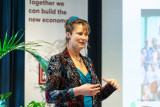
Are you working on societal change and do you want to boost your knowledge and strategies for transformative impact? Join us for the fifth edition of Societal Transitions: a 6-day masterclass in transition governance and transformative entrepreneurship that inspires you to drive systemic change from within and beyond your organisation (http://bit.ly/MCSOTRA\_2020).
A NEW PERSPECTIVE
Step back from your daily routines to connect with other motivated change agents and gain a new perspective on your mission and role as a change leader.
The Masterclass Societal Transitions, designed by Impact Hub Amsterdam and DRIFT’s Transition Academy, combines the latest scientific research on sustainability transitions, social innovation and entrepreneurship with pragmatic insights and experiences from transition management and entrepreneurial practice. Special attention is paid to issues of power relations and processes of empowerment, including the paradoxes and dilemmas underlying change. Our speakers and facilitators are action researchers, entrepreneurs and changemakers who are specialised in understanding and accelerating transformative change in diverse fields of work, including climate change, energy, agro-food, inclusiveness & participation, sustainable urbanism and circular economy.
WHAT WILL YOU LEARN?
Over the course of five thematic modules, spread over five days and one evening, you will:
• Apply system thinking
• Analyze transition dynamics in your field
• Identify relevant actors and power relations
• Recognise societal trends and movements
• Design a transition intervention
• Construct your own transition strategy
WHOM IS THIS FOR?
• Sustainability professionals
• Decision-makers
• Impact entrepreneurs and intrapreneurs
• Researchers
• Policymakers
• Civil servants
The Masterclass is designed for a diverse combination of policy & decision-makers, sustainability professionals, network leaders, researchers and other changemakers. You represent a variety of fields, ranging from energy, food and circular economy, to inclusivity, participation, health and education, and/or holistic perspectives on sustainable and just cities and regions. You share a strong commitment to being in a learning trajectory that combines intellectual input with active participation and learning from and with each other.
TIME SCHEDULE MASTERCLASS
• Day 1 – Monday 26th of October 2020 – 09:00-17:00
• Day 2 + evening – Tuesday 27th of October 2020 – 09:30-21:00
• Day 3 – Wednesday 28th of October 2020 – 09:00-17:00
• Day 4 – Thursday 29th of October 2020
• Day 5 – Friday 30th of October 2020 – 09:00-16:00
• Day 6 – Friday 22nd of January 2021 – 09:00-17:30
REGISTRATION
Registration proceeds via our online registration form (https://bit.ly/3gdoq4M).
PRICE
The course fees for the 2020 edition of Societal Transitions are:
€ 3995,- for corporate / government / public sector*
€ 3241,- for NGO’s / small organisations / freelancers / individuals*
Early Bird fees (valid when you apply before 22 July 2020):
€ 3395,- for corporate / government / public sector*
€ 2755,- for NGO’s / small organisations / freelancers / individuals*
The course price includes full participation, lunches, drinks and one dinner. Upon successful completion of the course, participants will be granted a certificate from DRIFT Transition Academy, Erasmus University Rotterdam.
*All prices listed are exclusive of 21% VAT
The new commons: Empowering citizens
In a time that empowering citizens is hot, you might consider reading the seminal book of Elinor Ostrom, Governing the Commons. No time? My newest post is informative too and offers many examples of urban commons. Did you know that the commons movement in Italian cities is thriving and that Bologna is experimenting with new forms of urban government, the city as a common?
Lees de al eerder gepubliceerde Nederlandse versie hier: https://wp.me/p32hqY-1T0
RE:SHAPING CITIES | LIVE WEBINAR | WORK & THE CITY

The world of work is rapidly changing. While automation and innovation were already disrupting our jobs, the current pandemic is accelerating this drastic development. New dilemmas arise. To what extent will people still convene in person? Will this be the end of “office centricity”? Will this lead to a decline of “city centricity”, too? How will these changes affect our work-life balance? How much office space do we actually need in a (post) pandemic era? How will urban business environments adapt? And should we bracing ourselves for widespread job losses or will we rise again and find new ways towards resilience? Although there are challenges, we will use this webinar to explore opportunities and come up with insights and ideas together to be able to embrace the current state of flux and fix the post-pandemic future of work.
Ondernemers geven samen vorm aan 1,5-meter-economie
Ruim 120 ‘corona-proof’ initiatieven in de Ondernemerspitch
‘Find Space’, ‘OrderMe’ en ‘De Groene Lobby’ hebben de drie beste initiatieven voor een 1,5-meter samenleving. Na een selectie uit ruim 120 ingezonden ‘corona-proof’-initiatieven van ondernemers uit de Metropool Amsterdam, hebben tien ondernemers in pitches van twee minuten hun idee toegelicht om de 1,5 meter-economie van Amsterdam mede vorm te geven.
1.5 meters is the new unit for smart city designers.
As Covid-19 continues to wreak havoc on public health and local economies around the world, one over-looked Corona casualty has been our collective space. Here in densely populated Amsterdam we are slowly, carefully, cautiously transitioning into a new urban landscape. As a smart city architect and designer, I wanted to start exploring this new 1.5 meter unit on the Marineterrein, Amsterdam’s inner-city testbed for future living environments. Using a computer fan, dental mirror, lego, and yes - a Laser pointer, I set out with my son to visualize what social distancing means on footbridges, fitness gardens, picnic tables, park benches, stairs, swimming docks and familiar Amsterdam furniture. Watch the video and learn how to build your own at https://www.tapp.nl/blog/mapping-social-distance-in-an-inner-city-testbed
Stay up to date
Get notified about new updates, opportunities or events that match your interests.

